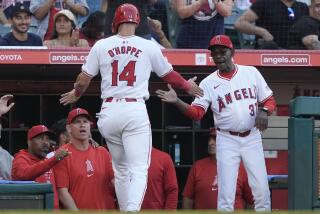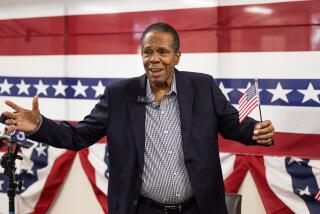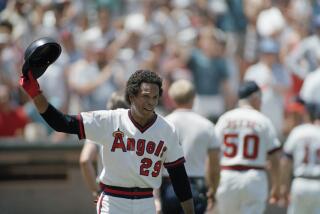Rod Guru : Angel Hitters Go to Carew, Their Man on the Mountain, and Erupt Like Mount St. Helens
- Share via
It was five hours before a recent game against the Seattle Mariners when Angel hitting instructor Rod Carew arrived in the Anaheim Stadium clubhouse carrying a videotape of the previous game and the notebook in which he keeps a record of every pitch of every at-bat involving his players.
Carew wore jeans and a black T-shirt. Inscribed on the back: “The Older I Get The Better I Was!”
Soon to be 50, the march of time can’t improve much on the way Carew was.
His Hall of Fame credentials included 3,053 hits, seven American League batting titles and a .328 career average in 19 years with the Minnesota Twins and the Angels.
He retired after the 1985 season but is still having an offensive impact as the man who has helped mold the surprisingly explosive attack of the team that is running away with the American League West.
Insistent on professionalism in appearance and approach--he is the resident cop who fines players a dozen golf balls if he detects a lack of respect for uniform or game--Carew has Angel hitters polished and prepared.
*
Whether it’s pitching early batting practice, or supervising the nightly meetings in which his hitters discuss the opposing pitchers, or communicating instructions from the dugout to the batter’s box by a piercing whistle and sign language, or dissecting game tapes until 4 a.m., he is tirelessly vigilant--and more.
“I picture Rod as this great guru on top of a mountain in the Andes, only it’s a state-of-the-art mountain where he has videotapes of every hitter and every pitcher and people come from all over the world to find a remedy,” said Rex Hudler, the Angels’ irrepressible utilityman.
“But think about this. He isn’t on that mountaintop. He’s right here. He’s our own. We’ve got him to ourselves. How selfish is that?”
Carew is in his fourth year as the Angels’ hitting instructor. In what has been a consistent reflection of education and maturation, the team batting average in that time has evolved from .243 to .260 to .264 to .288 through Friday, second in the American League to the Cleveland Indians’ .291. The Angels lead the major leagues in runs, having scored in double figures 17 times and won eight games by 10 or more runs.
They also lead the league in walks and on-base percentage, reflective of a patient and confident willingness to go deep in the count.
*
“Rod’s strength is in the area of preparation and mental approach,” said Tim Mead, assistant general manager.
“We seldom have a wasted at-bat, and there isn’t a pitcher who goes to the mound without our hitters having some familiarity with him.”
The Angels opened the season in pursuit of a hitter for the middle of the lineup. The group known as Carew’s Crew has responded to the search.
Jim Edmonds, in his second full season, has raised his career average 41 points, is tied for second in the league in runs batted in and seems headed for 30 home runs. J.T. Snow is up 80 points from his career average and has 76 RBIs. Gary DiSarcina, a career .242 hitter, was batting .317 when he went down for the season with a torn thumb ligament. Chili Davis is up 78 points from his career average. Tim Salmon is up 52 points and headed for another blockbuster season of about 30 home runs and 100 RBIs. Garret Anderson, who arrives for work even earlier than Carew, could be selected rookie of the year. He’s hitting .354 and has 12 home runs in 206 at-bats.
Carew said he takes pride in the success of his young hitters.
“This has been a continual learning process,” he said. “It didn’t happen overnight. In some cases, it’s been two or three years.
“I know how hard they’ve worked, so there’s a lot of gratification when they become successful with some of the things I’ve suggested.
“I can’t help but smile when I see them smiling.”
Snow said: “Some of us took a beating for a couple of years before we saw the light. In my case, I hit a lot of home runs early and thought that’s what first basemen are supposed to do. Rod finally convinced me that I’m more of a line-drive and gap hitter, that I can drive in a lot of runs without hitting home runs.
“Most hitting instructors preach a certain style, but Rod takes what you’ve got and works around it. His emphasis is on the mental side. Patience. Pitch selection. Familiarity with the pitcher. His emphasis is on making every at-bat a good one.”
Carew was basically a contact hitter who used the entire field.
Patience?
“Rod Carew could hit .300 walking to the plate with an 0-and-2 count,” said Mariner Manager Lou Piniella, a hitter’s hitter himself.
“I finished about five points behind him in the batting race one year and felt I had won the title.”
Carew said it doesn’t matter what type of hitter he was because he can adjust to any style and doesn’t make the mistake most hitting instructors do, trying to apply the same swing to every hitter.
“You’re talking about 14 or 15 different styles and personalities,” Carew said. “You have to try different things with different players. You have to find the area in which each of them is comfortable. The most important thing to me is mental. I’ve always felt that when a hitter suffers a breakdown, it’s more mental than mechanical.
“I try to put them in my shoes, to lean on my experience while working within the parameters of their physical approach. I don’t accept complacency or satisfaction. If they get two hits, I want them to think about three. If they get three, I want them to think about four. I consider that important. We can go out to lunch or dinner and clown around at times, but when we work, we work. I tell them, ‘This isn’t for my benefit, it’s for yours.’ ”
Carew operated a batting school near his Peralta Hills home for six years after retiring. Several major leaguers, including Davis, attended for refresher courses, but it was Carew’s work with youngsters that provided him with the patience that has been critical since returning to the Angels.
“I couldn’t expect the kids to do everything right all the time, and it’s the same way with major leaguers,” he said, adding that he finally burned out over the long hours at the school and the discouraging aspect of “sending kids out with a professional approach to hitting and having their Little League or high school coaches insist on changing it right away. I mean, I didn’t want to be in the business just to take kids’ money.”
Carew ultimately accepted Buck Rodgers’ invitation to become his hitting instructor with the Angels.
“Buck and I had been together with Minnesota and had always been friends,” Carew said. “He had asked me to join him a couple of times when he was managing in Montreal, but I wasn’t ready. I told him: ‘Maybe, if you ever come home to manage the Angels, I might reconsider.’ He used that line on me when he got the Angels’ job. He said: ‘Hey, you’ve got no excuses now.’ ”
Rodgers was fired last year and replaced by Marcel Lachemann, but Carew said both managers have been secure enough with their own situation to “let me run my own program as long as I keep them abreast of what we’re doing. Lach has done a great job stressing preparation, work habits and what he expects on the field.”
Lachemann, an advocate of the small details of preparation, operates a highly effective coaching staff. The daily workout and lineup sheet is produced on a computer and includes a motivational slogan for the day. The club now has a full-time strength coach in Tom Wilson, who has every player on a program. Bobby Knoop, who has long compiled extensive defensive charts, now incorporates them with a computer program, allowing him to position Angel fielders--a factor in the Angels’ near league-leading fielding percentage. Joe Maddon keeps a computer record of opposing managerial tendencies, when and on what count they steal, hit and run, possible signs. Pitching coach Chuck Hernandez asks the pitcher for the next game to chart the current game.
“Hopefully, if we’re together for a few years, we should build up a pretty good data base,” Maddon said.
Mead said: “The key to this team is preparation.”
Carew exemplifies it by his night-owl hours reviewing tapes--he carries a video machine on the road--and his pregame meetings in which hitters talk about that game’s opposing pitcher, a discussion often led by the hitters themselves.
Much has changed from that incident of a few years ago when an Angel hitter sat on the bench 15 minutes before the start of a game and asked who was pitching for the other team.
“I don’t ever want a hitter walking to the plate and asking the guy who had just hit what the pitcher throws,” Carew said. “That illustrates a lack of preparation. They should know before they get there.”
Carew saluted the input of Davis as another voice of credibility for the younger players and said it has been a very fruitful year in which the offense “has been a lot like Mt. St. Helens, waiting to erupt. You can sense it in the dugout. They believe it’s just a matter of time before they get to a pitcher, any pitcher. They realize there are some days a guy might stick it to you, but they’re not going to lie down in the process. They take it to the last out every game, and that’s rewarding too.”
Which is not to say that Carew hasn’t collected his share of golf balls--he gives them to the trainers or other coaches--for certain transgressions, but no one, Mead said, really gets into Carew’s doghouse “unless he’s close-minded, and in that case he probably wouldn’t be here.”
Chad Curtis had some differences with Carew over his hitting approach and was ultimately traded.
Carew, with varied interests, isn’t sure how long he’ll stay with this job. He said he’s taking it year by year.
“Rod likes to say that he’ll be gone after this year, but I doubt it,” Davis said. “He enjoys watching a guy go from .220 to .290, knowing he’s been part of it. I mean, it’s not self-gratification. It’s just his feeling that if you can hit a baseball at all, you should be able to improve with hard work.”
Hudler, a .256 career hitter, works hard at it. He hits into the soft-toss net nightly, Carew lobbing balls to him.
“Picture that,” Hudler said. “Rod Carew on his knees lobbing balls to me, a .250 hitter. How can it be?
“I told him, ‘Rod, get off your knees,’ and he said, ‘No, man, it’s my job.’ So I said, ‘It may be your job, but you’re not going to pick up the balls when we’re done. No way. I’ll do that.’
“I mean, the man should be on a mountaintop, not on his knees. The least I can do is pick up the balls. I’m not going to stand there and watch the guru do it.”
(BEGIN TEXT OF INFOBOX / INFOGRAPHIC)
Carew’s Hit Men
A look at how some of the younger Angel players have improved at the plate under Rod Carew’s guidance: *--*
Year AB HR RBI Avg. JIM EDMONDS 1993 61 0 4 .246 1994 289 5 37 .273 1995 384 26 88 .310 J.T. SNOW Year AB HR RBI Avg. 1993 419 16 57 .241 1994 223 8 30 .220 1995 369 16 76 .312 GARY DiSARCINA Year AB HR RBI Avg. 1993 416 3 45 .238 1994 389 3 33 .260 1995 328 5 41 .317 TIM SALMON Year AB HR RBI Avg. 1993 515 31 95 .283 1994 373 23 70 .287 1995 363 27 79 .328
*--*
The following players have spent a majority of their careers with other teams. A look at a typical season with other hitting instructors and with Carew: *--*
AB HR RBI Avg. CHILI DAVIS w/o Carew 518 18 74 .270 w/ Carew 454 25 93 .293 REX HUDLER AB HR RBI Avg. w/o Carew 159 4 12 .250 w/ Carew 167 5 24 .279 GREG MYERS AB HR RBI Avg. w/o Carew 224 5 24 .237 w/ Carew 235 5 29 .251 SPIKE OWEN AB HR RBI Avg. w/o Carew 404 4 34 .243 w/ Carew 249 3 36 .276
*--*
More to Read
Go beyond the scoreboard
Get the latest on L.A.'s teams in the daily Sports Report newsletter.
You may occasionally receive promotional content from the Los Angeles Times.






